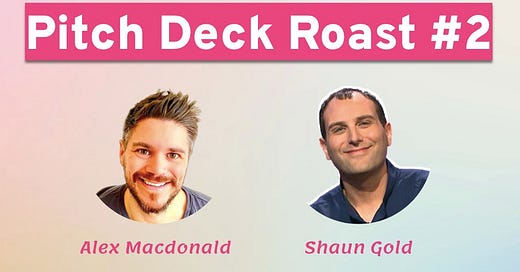Two minutes forty-two seconds. That’s the average amount of time an investor will spend looking at your deck.
Investor attention-span is also shortening (down 24% in just the last year).
Your deck is your first impression. While it’s only the start of the funding process, it’s also the most important part.
I send ~20 emails or voice notes a month to founders with detailed feedback on their decks.
Looking back over those emails just now ~80% of the feedback is almost identical.
This means there are still some very common misconceptions on what founders think investors are looking for in a deck. Therefore it takes longer for investors to assess companies and longer for founders to raise money.
Today I’ll be doing a live Pitch Deck Roast with Shaun Gold and Stéphane Nasser from OpenVC.
We will be giving live feedback on pitch-decks. Expect a mixture of spicy takes and useful constructive feedback. You’re invited to join us, register now.
In the meantime here are the most common snippets of feedback I give founders on their decks:
Keep it short - there is no romance without mystery. Your goal with the deck is to secure a call with the investor. It is not to answer every question about your business. You should create intrigue with a 10,000 ft view rather than exhaustion with every detail on the business. At the early stages anything longer than 12-13 slides is overkill.
Use a designer - investing in a deck designer is probably one of the highest-leverage investments you can make at the early stage. Your deck is the first impression of your business and ensuring it is well designed will lead to a much higher conversion of investor discussions. It’s also less expensive than you might think - if you’d like an introduction to a great deck designer I use who can do a deck for <$500 - reply to this post and I’ll introduce you.
Team - this is your most important slide at the earliest stage. Focus on the core team members (rather than advisors) and their track records. What have they built and achieved? What makes them the perfect fit for this business and market?
Structure - this can vary by company, but I think at the earliest stages all decks need to answer these questions (see each question as what you need to answer on 1-2 slides):
What is the problem you’re trying to solve?
How are you solving it? (product)
How big is the market?
Why now? (market trends)
What is your planned business model?
Why is this the right team to win?
What have you achieved so far? (traction)
How much are you raising? What will it be spent on? What milestones will you hit with this raise?
How can investors contact you to be a part of the raise?
Give a range & no valuation - do not give a specific number for your raise. Give a range (eg $750k-1m). This gives you more flexibility as you proceed with the funding process. It also means you are less likely to exclude investors based on the ticket size they can write. Do not put a valuation in your deck if you are going for a priced round, the investors will decide the valuation.
The format for the roast later is quite interesting - the OpenVC team will be opening decks live on the stream (that I haven’t seen before) and I will be giving live commentary of what is going through my head as we scroll through them.
It should give you rare and unfiltered insights into how investors look at a deck. Here’s the link again to join us, look forward to seeing you later:




